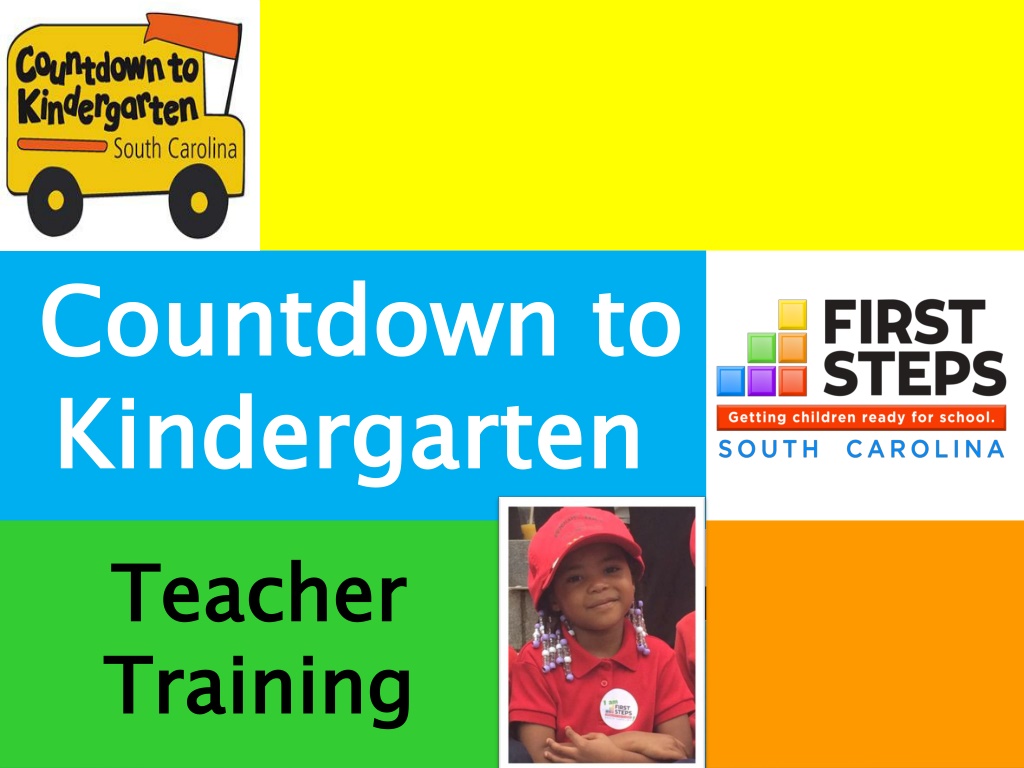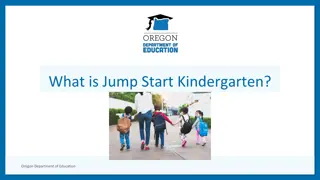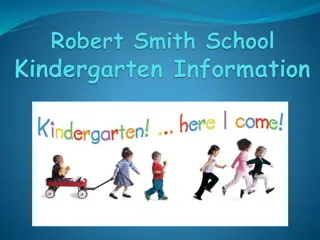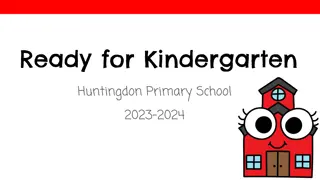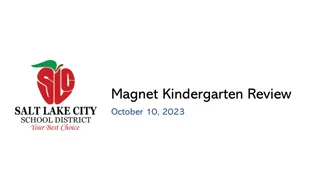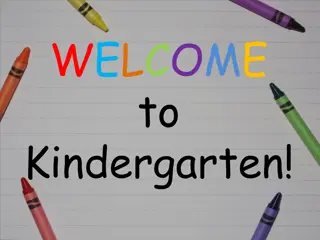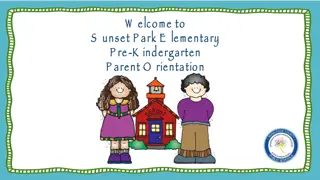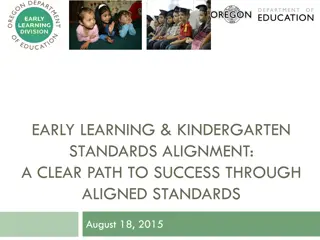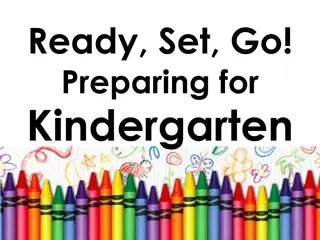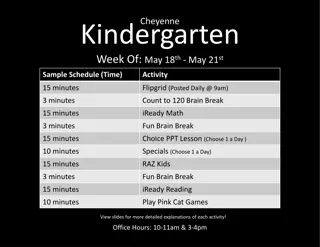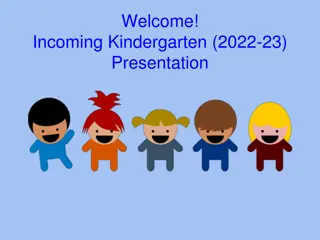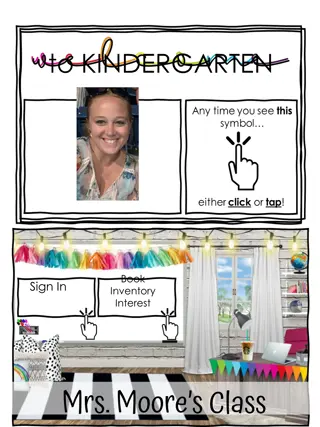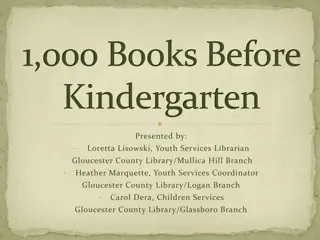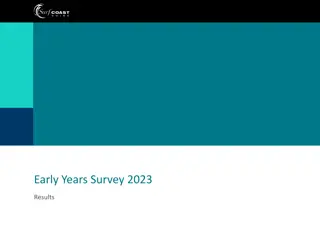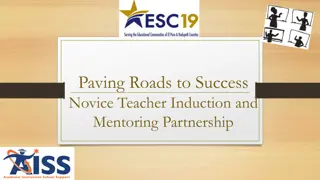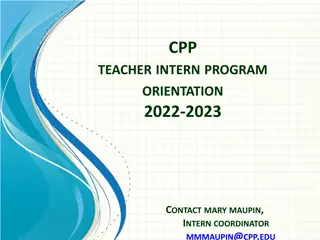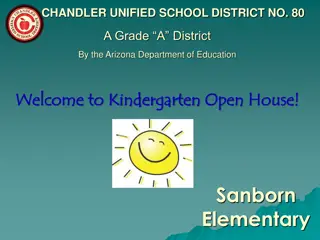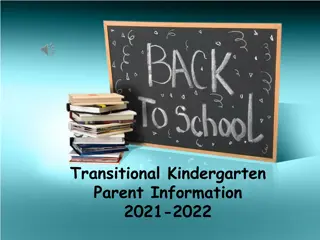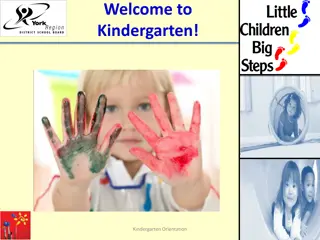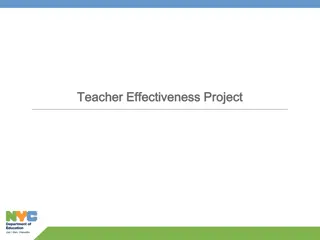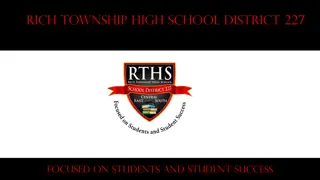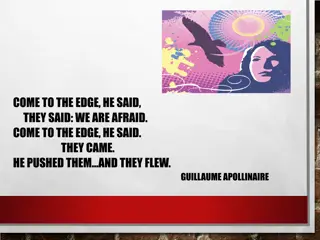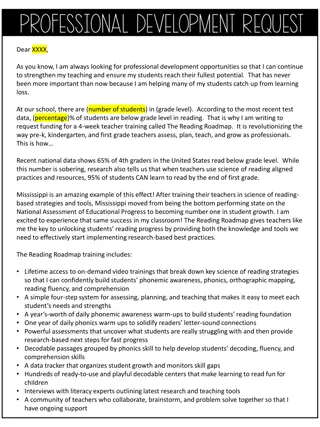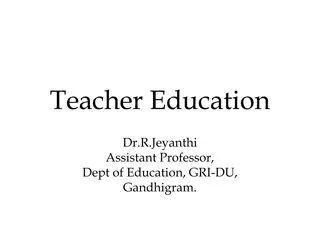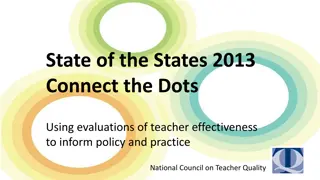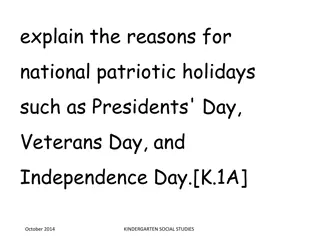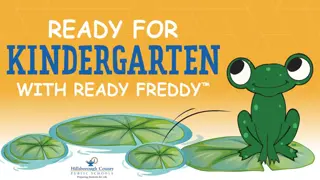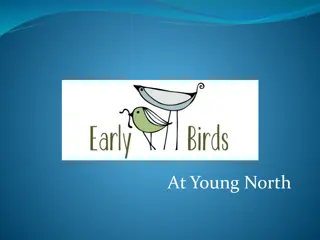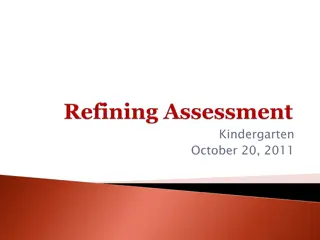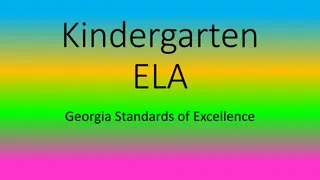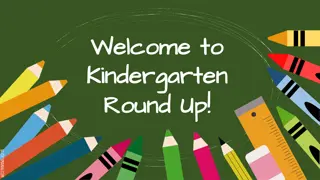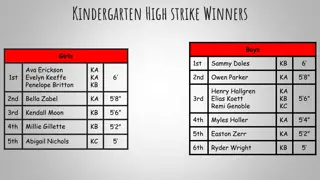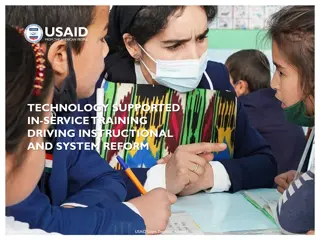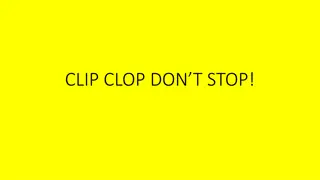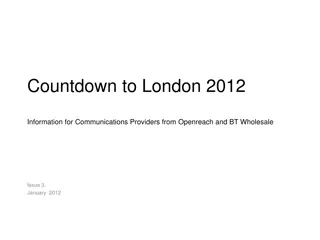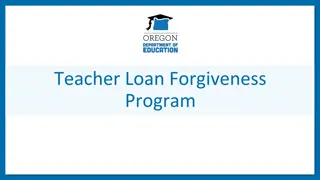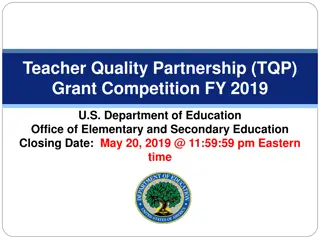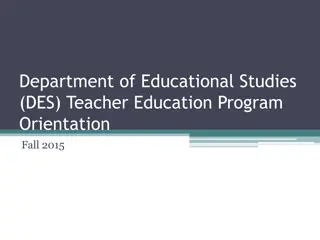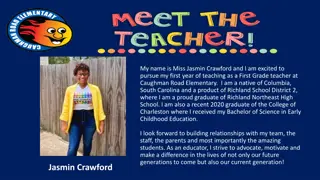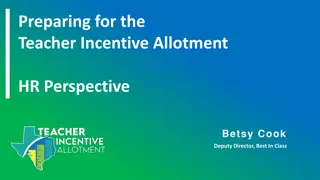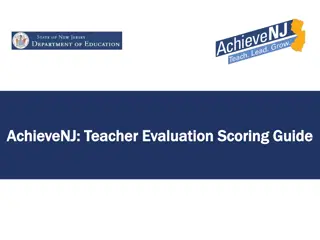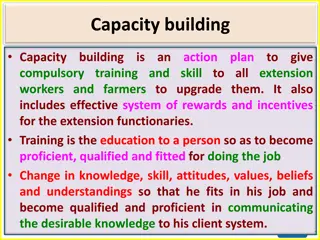Countdown to Kindergarten Teacher Training Program Overview
Countdown to Kindergarten (CTK) is a First Steps program in South Carolina aimed at successful school transition for at-risk children. It focuses on parent involvement, public awareness, and providing support to enhance early school success. The program includes home visitation, learning celebrations, public awareness campaigns, and has been a nationally recognized model for 13 years.
Download Presentation

Please find below an Image/Link to download the presentation.
The content on the website is provided AS IS for your information and personal use only. It may not be sold, licensed, or shared on other websites without obtaining consent from the author. Download presentation by click this link. If you encounter any issues during the download, it is possible that the publisher has removed the file from their server.
E N D
Presentation Transcript
Countdown to Kindergarten Teacher Training Countdown to Kindergarten Teacher Training
1. 2. 3. 4. 5. 6. 7. 1. Welcome & Introductions 2. Program History & Description 3. Administrative Requirements 4. Safety 5. Curriculum, Tool Kit, & Tips 6. Questions, Answers, & Next Steps 7. Adjourn Welcome & Introductions Program History & Description Administrative Requirements Safety Curriculum, Tool Kit, & Tips Questions, Answers, & Next Steps Adjourn
Countdown to Kindergarten (CTK) is a First Steps program based on other successful school transition models from around the country. Its goals are: to increase the successful transition of South Carolina s most at-risk children into the K-12 school system; to increase parent involvement in the early grades (particularly in hard-to-reach communities), when children s learning is foundational for life success; and to increase public awareness of the importance of school readiness and provide ways for parents and communities to impact children s early school success.
Home Visitation. of participating students and families. Visits are hour-long sessions whereby children and families are introduced to actual materials used in kindergarten and are given a Kindergarten Transition Toolkit (backpack filled with books, puzzles, clay, blocks, etc.) to keep. Home Visitation. Teachers make six visits over the summer to the homes Learning Celebration. the child will attend class in the fall. Early in August a CTK Celebration is planned to host the children and their families to a meal and celebration of their child s accomplishment. We build on their excitement by providing additional school supplies and books for the children and help the parents learn about other community resources to help their children excel in their efforts. Learning Celebration. The last visit is a field trip to the school where Public Awareness. statewide media to help parents and caregivers get children ready for kindergarten. Public Awareness. Throughout the summer, First Steps releases tips to
CTK is 13 years old this year! Over 10,000 children state participated. CTK is 13 years old this year! Over 10,000 children state- -wide have participated. wide have Program was developed in South Carolina and is a nationally recognized model. Program was developed in South Carolina and is a nationally recognized model.
1st Memorandum of Agreement & Confidentiality Form (Refer to local First Steps office for direction on who you contact) 2nd W-9 form (Refer to local First Steps office for direction on who you contact) 3rd Invoice Visit Stipend & Mileage on the same form (This may vary by county partnership) Electronic version of the form will be emailed to you $______ for completed visits (Mileage Info-based on your county partnership agreement or school district agreement) JUNE VISITS JULY/AUGUST VISITS AUGUST 15 JUNE VISITS Invoice due BY JULY 7 JULY/AUGUST VISITS Invoice & ALL REQUIRED FORMS due by AUGUST 15th Invoice due BY JULY 7th Invoice & ALL REQUIRED FORMS due by th th. .
Completing the teacher survey is required. Must be completed 9 weeks after school starts Specific survey information will be sent to you after the start of school from the State Office
Countdown Curriculum One set of parent handouts for each family Transition Toolkit Enrollment Forms Family Information Sheet Consent & Authorization Form Privacy Statement Family Eligibility Determination Form A Pre and Post Family Questionnaire Documentation of home visits made and mileage
Your safety is most important. It is a HOME Visitation Program. Things to consider: Speak with 4k teacher that may have already visited the family before to gain insight. Drive by the home prior to the first visit to familiarize yourself with the area. Notice your surroundings and whether or not there is adequate cellular coverage. Consider asking a school administrator to attend the first visit with you. Leave a schedule of where you will be and when you should be expected to return with a family member/school/friend. Your safety is most important. It is a HOME Visitation Program. Things to consider: Speak with 4k teacher that may have already visited the family before to gain insight. Drive by the home prior to the first visit to familiarize yourself with the area. Notice your surroundings and whether or not there is adequate cellular coverage. Consider asking a school administrator to attend the first visit with you. Leave a schedule of where you will be and when you should be expected to return with a family member/school/friend.
Focus on the family; get involved with them Have a positive attitude about being there and you will enjoy your visits Find and build on the positive aspects of the family Be a good listener Be flexible Be prompt Use professional language Dress appropriately and comfortably
Be confident Be yourself Respect cultural and ethnic values Monitor your own behavior-the parent is observing you Use common sense to maintain your safety Each time ask the parent/child if they have any questions
Impose your own values Exclude other members of the family from the visit Discuss other families in your program Be the center of attention. Expect perfection from the parent Act as if it is an academic program.
Carry extra stories in your bag to read to the children. Let your family members know the schedule. (Commitment form) Take everything out of the toolkit except art supplies and keep until each lesson (like taking a gift each time you go). Leave the family with the backpack and art supplies.
The home visitor administers the Pre Questionnaire to the parent/guardian of the CTK student during the first home visit. The home visitor administers the Post Questionnaire to the parent/guardian of the CTK student during the fifth or sixth visit. The home visitor should assign each family an individual family number (no family should have the same number as another family) for the Pre and Post Questionnaires. This identification system ensures each family s survey remains anonymous, yet allows a family s Pre and Post Questionnaire s to be evaluated.
The Parent Surveys (Pre and Post) are critical to measure program success. Pre Survey- 1st visit Post Survey 6th visit Parents have the option to take both surveys online or may complete a hard copy. After the Pre and Post Questionnaires have been completed, please submit both forms to your local First Steps County Partnership.
Set up all visits, write them on the family commitment form as well as your calendar emphasize the parent/caregiver s role in the visits Leave a telephone number Complete family information sheet, consent/media form, & Pre Parent Survey. Assign family number on form. This remains confidential. As you are sharing the toolkit with the child and parent remind them to keep everything together until the end of the program During this lesson use the crayons and writing journal to draw a self portrait Share a me box/bag and ask the child to make one for the next visit Record the visit on the Record of Home Visits Form
At this visit take cookie sheet to use for a magnetic board Bring ABC stickers (or sticker dots) to use for an art project After reading the story use the art materials to make a coconut tree and put ABC stickers on it Use the play dough to make letters of the alphabet (on the cookie sheet) Record the visit on the Record of Home Visits Form
Use the materials to work on math standards (measurement, counting, sorting, and patterning) After the child creates a pattern have him/her use the crayons to reproduce it in the writing journal Use the construction paper and cut squares to match the pattern and glue them into the writing journal After the puzzle use the play dough to make numbers and show them how to write them in the writing journal Record the visit on the Record of Home Visits Form
Talk about our five senses and look through a magazine to find pictures of things we can see, smell, touch, taste, and hear. Cut and glue them into the writing journal Take a bag of objects that you and the child can explore using the magnifying glass. Read the story- Brown Bear Brown Bear, talk about five senses and describe how we use our sense of sight to see After reading the story we talk about favorite character and we draw it in the writing journal Record the visit on the Record of Home Visits Form
Read any story relating to week 5 topics as they may pertain to how we are alike and different and when we get to school how we will learn to make good choices at school, learn to be safe, and get along with each other. Give each child a dry erase board and marker and use it to practice writing his/her name, letters, and/or numbers. During this lesson discuss how we will learn how to get along with each other Review the materials from the toolkit with the child/parent to use the rest of the summer Record the visit on the Record of Home Visits Form
Can be completed as a group of Countdown to Kindergarten students and families. Invite administrators, guidance counselors, and librarian if they are available. Use this time to answer questions the parents may have (lunch, bus schedules, etc.) Give out registration materials (if principal approves). Should be focused on the Countdown to Kindergarten children not part of regular registration day. Parent completes the Post Survey Record the visit on the Record of Home Visits Form
- Today Sign MOA, Confidentiality Form, & W9 Pick-up toolkits, supplies, and notebooks - Next Week Copies of MOA and excel invoice file will be emailed to you. Begin scheduling visits can begin as soon as school is out. - During Summer Check email for information requests, etc. Let your county partnership contact person know when 6th visit is planned (so they can arrange for pictures, etc. for newspaper).
Effective teachers have a plan. If you dont have a plan, then you re planning to fail. Always remember that home visits can be a significant resource in improving student academic and social achievement. You have your first ten students in CTK to make that difference. Enjoy your visits and be safe!
